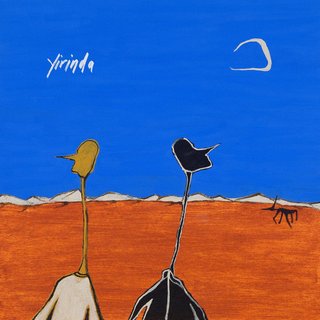The Butchulla people have lived as owners of K’gari for over 5000 years. In the 20th century, their language almost disappeared forever.
Government reserves and missions across the ‘Fraser Coast’ forbid the use of Butchulla language in attempts to wipe out knowledge and culture.
Fred Leone is one of three living Butchulla Songmen, a keeper of language and songs of the Butchulla people, performed through song and dance. It’s a position of deeply important cultural custodianship, continuing the precious work of Butchulla generations past to who kept these songs alive, saving crucial histories and connections to the land against all odds.
Yirinda, the debut album between Fred Leone and contrabassist and composer Samuel Pankhurst, is itself an act of preservation. Songs and stories once performed are now embedded as recorded, arranged pieces of music.
Every track on Yirinda is a vivid imagining of different Butchulla songs , each in conversation with the stories and meanings of each. Some songs are minimal in construction, featuring just Leone’s Kuluru, (didgeridoo) or Bargain, (boomerangs). Sometimes only Pankurst’s yearning orchestral arrangements and drones accompany Leone’s singing, creating an aching, soaring soundscape.
Thrillingly, Yirinda is never static in sound. Other tracks venture into polyrhythmic free jazz, with plucked strings, trumpets and glitch giving an improvisational edge. And while some of the songs themselves are thousands of years old, others are newer: Ba Gi Lam (Fighting) is a battle song against colonisation of K’gari.
In Butchulla, ‘yirinda’ means ‘now.’ As much as the record is an act of documentation, it’s also a continual re-living; a new representation of old knowledge, an enshrinement of something new, something special.
Words by Lindsay Riley
